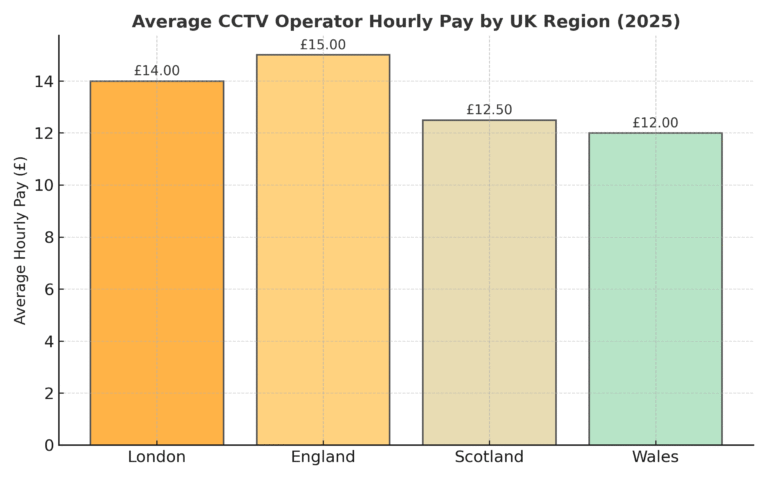Subtotal:
£25.99
In 2025, the average CCTV operator salary ranges from £11 to £14 per hour, or around £27,000 a year. Pay is higher in London and for night or weekend work. Your wage also depends on your experience, employer, and if you have an SIA CCTV licence, which helps you get better-paying jobs. It’s a steady and reliable career in the UK security field. If you’re thinking about becoming a CCTV operator, now is a great time. With the right skills and licences, you can earn good pay and enjoy flexible shifts.
In this guide, we’ll explain details on CCTV operator salaries in the UK for 2025, including:
- Hourly rates and yearly pay
- London bonuses and regional differences
- Night and weekend shift premiums
- The importance of an SIA CCTV licence
Whether you’re just starting or looking to move into senior roles, this guide shows how to boost your pay and enhance your career in UK security. It’s a steady, reliable job with plenty of opportunities for those who want to advance.
How Much Do CCTV Operators Earn per Hour?
Let’s talk about the hourly rate, which is what most people focus on. At present, the average pay for a CCTV operator across the country is approximately £11.44 to £13.50 per hour. With the lower end aligned closely with the expected 2025 National Living Wage (NLW) floor.
However, if you’ve got some experience or you’re working for a big-name company, you can often push that up to £13 to £14 per hour. Some reports show surveillance operators at major firms earning around £13.62 per hour! So, aim high, and don’t settle for the bare minimum if you can help it. This is your CCTV operator wage we’re talking about.
What are the Average CCTV Operator Earnings per Year?
To give you the bigger picture, if you’re working full-time, the typical CCTV operator’s salary ranges from about £23,600 to £24,400 per year. That’s a decent, stable starting point.
More broadly, the overall pay bands for CCTV operators fall between £20,600 and £27,000. To get to the top of that bracket, you’ll likely need to either live somewhere expensive (like London) or work in a highly specialised, challenging control room.
Do Night Shifts and Weekends Increase CCTV Pay?
Definitely! This is one of the best ways to boost your income. Night shifts, weekend shifts, and working on bank holidays almost always come with a special “shift allowance” or “premium pay“.
Generally, these extras depend on your contract; they’re not guaranteed but are common in the industry. For instance, some weekend-only roles are advertised at around £13.25 per hour as a base, which is a great rate! If you don’t mind keeping unsocial hours, those CCTV operator job opportunities are golden for your security and CCTV jobs income.
Does London Weighting Boost CCTV Operator Pay?
Absolutely, yes! If you can handle the cost of living, moving to London can seriously pay off. CCTV security jobs London generally pay more across the board.
Even though some London ads might show around £12 per hour (approximately £25k per year) for basic roles, the actual take-home pay is higher once London Weighting and other allowances are included. The capital often has more premium contracts, which is a huge benefit for your CCTV operator’s salary.
Here is the average hourly pay for CCTV operators across UK regions in 2025:

Do You Earn More with an SIA CCTV Licence?
Without a doubt! Think of the SIA Public Space Surveillance (CCTV) licence as the VIP pass to the best jobs. Many of the top-paying control room jobs in the UK require this licence. It opens doors to highly compliant sectors like transport, local councils, and corporate security. Simply put, if you don’t have that SIA badge, your options and your pay potential are seriously limited. So, get licensed! It’s worthwhile for any CCTV operator aiming to become a professional operative.
If you’re serious about getting licensed and stepping into better CCTV roles, our CCTV Operator Career Guide breaks it all down for you: training, jobs, and pay!
How Does Experience Change a CCTV Operator’s Pay?
Just like in any job, the more experience you have, the more you can command!
- Getting Started: You might start lower, perhaps £11 to £12/hour.
- A Few Years In: Once you have 2 to 3 years of proven experience, you can confidently ask for the £13 to £15 per hour range.
- The Top Tier: If you become a senior operator or supervisor in one of those huge, specialised control rooms (especially in London), your CCTV operator wage can soar to £30,000 to £40,000+ annually. That’s a serious incentive!
Security Company vs In-House: Who Pays Better?
A choice many people have to face all over the world. Normally, pay depends on your employer type:
- Contract security firms (e.g., Securitas) often offer more shifts and overtime, but base pay is usually £11 to £13 per hour.
- In-house/public bodies (councils, transport, hospitals) usually pay £23k to £26k per year with allowances, pensions, and London weighting, though entry can be harder.
A comparison table can make this clearer:
|
Feature |
Contract Firms |
In-House / Public |
|
Base Pay |
£11–£13/hr |
£12–£14/hr |
|
Annual Salary |
~£23k |
£23k–£26k |
|
Overtime |
Many opportunities |
Some opportunities |
|
Benefits |
Limited |
Pension, allowances, and London weighting |
|
Entry |
An SIA licence is usually enough |
SIA licence and experience are often needed |
|
Shifts |
Flexible |
Fixed rotations, nights/weekends |
Remember: extra pay (night/weekend shifts) depends on your contract. It’s common but not guaranteed.
Public Sector vs Private Sector CCTV Pay: What’s the Difference?
When you’re comparing the two:
- Public sector jobs (like your local council) usually give a clear, steady package: base pay, shift allowance, weekend pay, and London weighting.
- Private sector pay can be all over the place. It depends on the client and how risky the site is. Big corporate sites usually pay more than quiet commercial ones.
A quick table helps you see the difference:
|
Feature |
Private Sector |
Public Sector |
|
Pay |
£11–£14/hr |
£12–£14/hr (+London weighting) |
|
Yearly Salary |
~£23k |
£23k–£26k, up to £28k |
|
Shift Pay |
Sometimes |
Often included |
|
Benefits |
Few |
Pension, holiday, sick pay |
|
Entry |
SIA licence |
SIA licence + experience/checks |
|
Job Security |
Less stable |
More stable |
|
Employers |
Shops, offices, private sites |
Councils, hospitals, transport |
In a sentence, public sector roles usually have better stability and benefits, whereas private sector pay depends on the client/site.
Do Overtime, On-Call, and Allowances Add Much to Pay?
Oh, yes! These elements are where your money can really start to grow. Paid overtime (often time-and-a-half or double-time) and unsocial-hours premiums can truly make a material difference to your take-home pay.
However, and this is important, the rules for getting overtime or on-call retainers are different for every single contract. So, you must read the job advert closely. If you see good overtime rates, it’s a great sign for a top CCTV operator job!
What Shift Patterns Affect CCTV Operator Earnings?
Since surveillance rooms must be covered 24 hours a day, 7 days a week, the most common setup is the 4-on/4-off, 12-hour rotation. This kind of pattern guarantees that you’ll be working nights and weekends. And why is that good? As we talked about, those shifts are the ones that attract premium pay and give you more opportunities to grab extra overtime hours, seriously boosting your income as a CCTV operator or CCTV operative.
How to Increase Your CCTV Operator Salary (Skills & Progression)
Ready to move beyond the average pay? Here’s your action plan for boosting your salary:
- Licensing First: Get that SIA CCTV (Public Space Surveillance) licence and renew it.
- Get Dual Licensed: Add a Door Supervisor licence to qualify for more flexible, higher-paid dual roles.
- Master the Tech: Learn the ins and outs of all the control room software. This now includes proficiency with AI-driven video analytics, remote monitoring platforms, and cloud-based VMS (Video Management Software). Technical skill pays!
- Get Certified: Having first aid or even GDPR knowledge for surveillance is a big bonus.
- Target Smart: Only apply for roles in high-paying sectors, such as transport, major councils, corporate SOC/GSOC teams, and critical infrastructure.
Where to Find the Best-Paid CCTV Operator Jobs in the UK
The best roles require a targeted search strategy. Look here:
- Job Boards: Use platforms like Indeed and filter for “CCTV Operator” plus strong keywords like “London”, “City”, or “Transport”. Check if the adverts mention “shift allowance”.
- Go Direct: Always check the official job portals for local councils and transport authorities; they often list the most stable, best-packaged jobs.
- Corporate Security: Search for openings with large finance, energy, or tech firms that run their own in-house Security Operations Centres.
If you can find a ‘CCTV security jobs London’ advert offering £15.16/hour or more, you know you’re on the right track!
Final Thoughts: Getting the Best CCTV Operator Salary in 2025
Let’s wrap this up with your winning strategy to maximise your CCTV operator salary in 2025:
- Your Badge is Your Bargaining Chip: Make sure your CCTV licence is always up to date; it’s the single biggest factor in unlocking the best jobs.
- Be Strategic: Aim for high-wage areas like London and look for those specific roles that guarantee extra income through night and weekend premiums or shift allowances.
By getting qualified and choosing your roles wisely, you’ll be well on your way to a stable and significantly higher CCTV operator salary in the UK security industry!
Are you serious about becoming a CCTV professional? Let us welcome you to our CCTV Operator Training (CPD-certified) course! Your first step toward becoming a skilled, licensed, and job-ready security professional.
Frequently Asked Questions
1. How long is a CCTV course?
- Most CCTV operator courses take 3 to 5 days to complete.
2. What jobs earn £300k a year in the UK?
- High-level roles like surgeons, lawyers, investment bankers, and CEOs can reach that range.
3. Is a CCTV operator a stressful job?
- It can be at times, especially during emergencies, but most days are calm and routine.
4. What is the highest salary for a CCTV operator?
- Senior or specialist operators can earn £30,000 to £40,000+ a year, especially in London.
5. What qualifications do I need to be a CCTV operator?
- You need an SIA CCTV (Public Space Surveillance) licence and basic security training.
6. Are CCTV jobs easy?
- They’re straightforward but require focus, patience, and good observation skills.
7. Is a CCTV technician a good career?
- Yes. It’s a practical and stable job with growing demand in security and technology.
8. How many hours do CCTV operators work?
- Most work full-time on rotating shifts, often 12-hour patterns like 4 days on, 4 off.
9. How much does a CCTV operator earn in the UK?
- On average, they earn £11–£14 an hour, or £23,000–£26,000 a year.
10. What qualifications do you need to install CCTV?
- Installers usually need a Level 2 or 3 qualification in CCTV installation or electrical systems.







